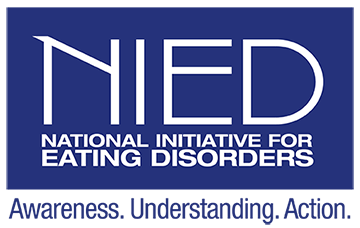The National Initiative for Eating Disorders (NIED) has developed the following guidelines to assist you in preparing to share your story about recovery with others within a public setting.
THINGS TO CONSIDER BEFORE SHARING YOUR STORY
- As you are not likely to know who is in your audience and what their experience has been, we suggest that you carefully consider the type of information that you choose to share.
We recommend that you be mindful of not sharing information that includes weight, size, body mass index (BMI), calories, exercise extremes and any graphic descriptions or extreme measures taken. This type of information can be very triggering and can have an adverse effect on some. - It is also important that your story speaks about YOUR lived experience and journey. Please consider that unless you are a clinician or professional, you should not provide medical or clinical advice.
- It is up to you to dictate how this information is going to be delivered and received. Feel free to ask if your story will be live-streamed or recorded. While you may feel comfortable sharing your story with a live audience, you may not be comfortable having your story recorded or broadcast online. In the same way you have the right to give or not give permission to have your photo taken, you have the same right to request that your story NOT be recorded or broadcast.
TIPS TO CONSIDER WHEN SPEAKING FROM YOUR PERSONAL EXPERIENCE
- Sharing your story can be a very emotional experience particularly since you are sharing underlying emotions and coping strategies. With this in mind, take your time, remember to breathe and don’t hesitate to take a break if that is what you need to do.
- Be honest and speak from your heart as this is your personal story.
- Encourage others who also may be struggling to seek help for themselves or their loved ones.
- Emphasize that while recovery from an Eating Disorder can be long and challenging, it is achievable.
- Share your understanding that the ups and downs you have experienced are part of the overall experience and do not mean failure. Yes, recovery is challenging, but recovery from an Eating Disorder is possible.
- People will be very interested in hearing about what you did differently to take better care of yourself.
- Sharing what changes you made to your life and the coping skills you utilized to help you be less critical of yourself is invaluable information worth sharing.
- As with any illness, having hope and a positive attitude is integral to the healing process, and consequently, there is much to be gained from hearing you discuss your hopes, dreams for your future, and what you have learned that has made you stronger.
- It is very important to remember that sharing your personal story can be an enormously emotional experience not only for you, the storyteller, but also for audience members who may have lived experiences or know someone challenged by an Eating Disorder.
QUESTIONS YOU MAY WANT TO ANSWER TO CREATE YOUR STORY
- Who did you speak to for support, professional help or encouragement?
- What did you do to plan ahead for those occasions, events or situations that you knew would be difficult (i.e. family celebrations, exams, holidays)?
Reminder: While telling your story, always suggest local, national, and international support organizations as resources.
Please share your story by emailing info@nied.ca
You have the option to include a photo of yourself, or a photo representing
your journey, or a symbol that helped you get through treatment.
